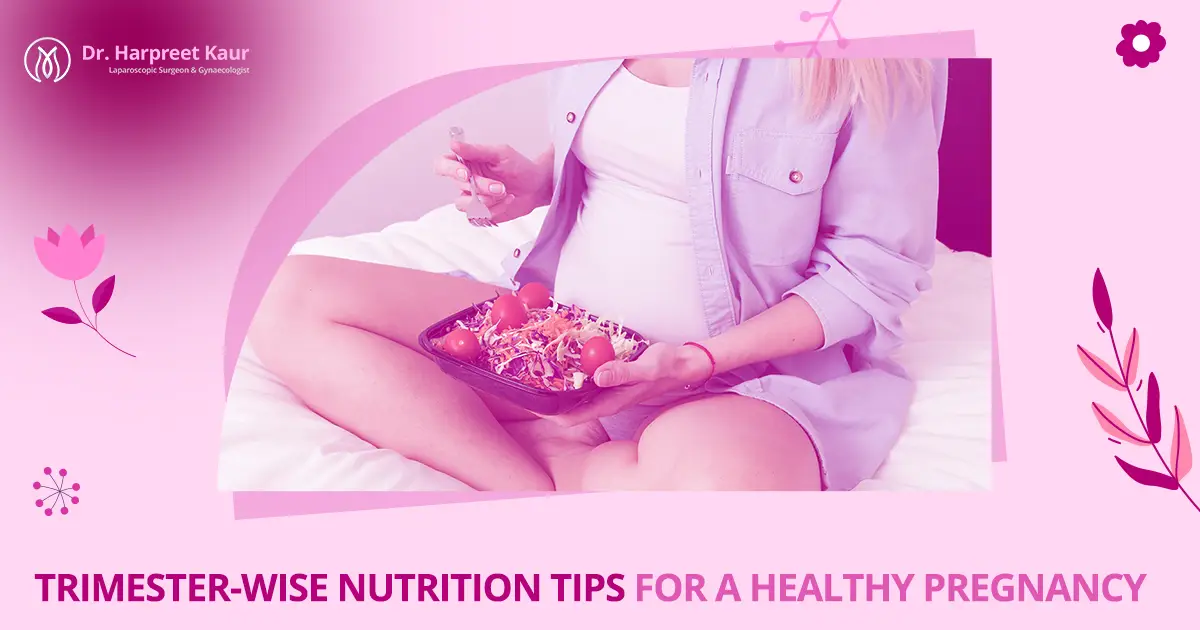Clinic Location
Care n Cure Clinic, Nayapalli, Near Hotel Crown, Bhubaneswar
For Consultation
+91 7008110200
+91 9090910009
Work Hours
Mon - Fri : 05:30 - 07:30
- Home
- About Doctor
- Services
Postnatal care
Gynaecological services
- General Consultatnt
- Adolescent Clinic
- Well Women Clicnic
- Gynaecological Surgeries
- Gallery
- Your Pregnancy
- Training
- Contact
- Feedback
- Blog
- Home
- About Doctor
- Services
Postnatal care
Gynaecological services
- General Consultatnt
- Adolescent Clinic
- Well Women Clicnic
- Gynaecological Surgeries
- Gallery
- Your Pregnancy
- Training
- Contact
- Feedback
- Blog
- Home
- About Doctor
- Services
Postnatal care
Gynaecological services
- General Consultatnt
- Adolescent Clinic
- Well Women Clicnic
- Gynaecological Surgeries
- Gallery
- Your Pregnancy
- Training
- Contact
- Feedback
- Blog
Trimester-Wise Nutrition Tips for a Healthy Pregnancy

Pregnancy is a journey of transformation that calls for special care, especially when it comes to nutrition. A healthy pregnancy diet plays a vital role in ensuring the well-being of both the mother and the developing baby. Dr Harpreet Kaur, an expert in maternal nutrition, emphasizes that each trimester brings unique nutritional needs. This guide offers trimester-wise pregnancy nutrition tips to support every stage of this remarkable journey.
First Trimester Nutrition: Laying the Foundation
Focus on Folic Acid
One of the most crucial nutrients during the first trimester is folic acid. It helps in the early development of the neural tube, which becomes the baby’s brain and spinal cord. Include folate-rich foods like leafy greens, citrus fruits, lentils, and fortified cereals.
Combat Morning Sickness
Nausea and vomiting are common in early pregnancy. Eat small, frequent meals, and choose bland, dry foods like crackers or toast. Ginger tea and peppermint may also help soothe the stomach.
Hydration is Key
Dehydration can worsen fatigue and nausea. Aim to drink at least 8-10 glasses of water daily. Herbal teas and fruit-infused water are excellent alternatives.
Avoid Harmful Substances
Limit caffeine and avoid alcohol, raw seafood, and unpasteurized dairy to reduce the risk of infections and developmental issues.
Second Trimester Nutrition: Fueling Growth
Protein for Development
The second trimester marks rapid fetal growth. Include quality protein sources such as eggs, lean meats, beans, tofu, and dairy products. These support muscle and tissue development.
Calcium and Vitamin D
Strong bones and teeth require calcium. Dairy, fortified plant milks, almonds, and broccoli are excellent sources. Pair with Vitamin D through safe sun exposure or supplements as advised by Dr Harpreet Kaur.
Iron to Prevent Anemia
Iron requirements increase significantly. Red meat, spinach, legumes, and iron-fortified cereals should be staples. Enhance absorption by pairing with Vitamin C-rich foods like oranges and bell peppers.
Healthy Weight Gain
Gradual weight gain is normal. Choose nutrient-dense snacks such as yogurt with fruit, peanut butter on wholegrain toast, or a handful of nuts and seeds.
Third Trimester Nutrition: Preparing for Birth
Increase Caloric Intake
During the final trimester, energy needs are highest. Add around 450 extra calories per day through healthy options like smoothies, whole grains, and avocado.
Omega-3 Fatty Acids
Vital for brain development, omega-3s can be found in flaxseeds, walnuts, and fatty fish like salmon. Dr Harpreet Kaur suggests discussing supplements with your healthcare provider if dietary intake is low.
Fiber-Rich Foods
Constipation is common in late pregnancy. Boost fiber with fruits, vegetables, whole grains, and legumes. Drink plenty of water to help digestion.
Magnesium and B-Vitamins
These nutrients aid muscle function and reduce cramps. Eat dark chocolate, pumpkin seeds, bananas, and whole grains to meet your needs.
General Pregnancy Nutrition Tips from Dr Harpreet Kaur
Balance is Everything
Eat a variety of foods from all food groups. Focus on whole, unprocessed foods to nourish your body and your growing baby.
Supplement Smartly
While a balanced diet is ideal, prenatal vitamins are essential. Consult with a healthcare professional like Dr Harpreet Kaur to ensure the right dosage.
Mindful Eating
Listen to hunger and fullness cues. Avoid overeating under the guise of “eating for two.”
Monitor and Adjust
Every pregnancy is unique. Regular check-ups can help tailor your healthy pregnancy diet to your individual needs and any emerging concerns.
Stay Active
Physical activity complements good nutrition. Gentle exercises like walking, swimming, or prenatal yoga can boost energy and reduce pregnancy-related discomforts.
Conclusion
Trimester-wise nutrition is a cornerstone of a healthy pregnancy. Following these expert pregnancy nutrition tips from Dr Harpreet Kaur helps ensure that both the mother and baby thrive at every stage. With the right balance of nutrients, hydration, and mindful choices, you can lay the foundation for a safe and healthy journey into motherhood.
Remember, always consult with your healthcare provider before making any significant dietary changes during pregnancy.

